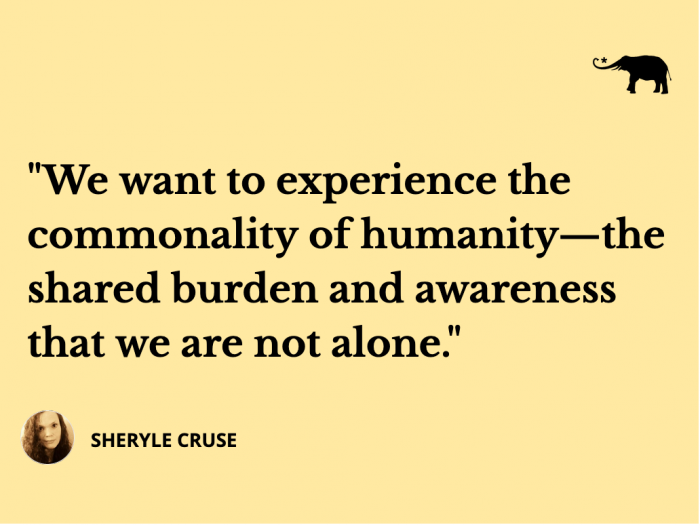View this post on Instagram
When I was deeply grief-stricken over a family member years ago, I encountered a moment of kindness.
Like many of us out there who encounter grief, I tried to resume my normal daily life.
I tried to get on with things. That meant taking the bus to get to where I needed to go. A bus ride. Not all that taxing.
Nothing seemingly upsetting about it, right?
But I was having a hard time making my life happen. Grief had disrupted it. Already incredibly sleep-deprived for weeks, my nerves were jagged. Emotions were heightened. And I could cry easily and intensely out of thin air.
As I was waiting for my bus, I felt the tears racing to my eyes. I felt the pounding pressure of upset. As I sat on that bus stop’s bench, I dreaded completely losing it as I was out in the open, out in public, with no shelter to hide my raw sadness.
Just then, I hear the whoosh of the bus door opening. I am around, perhaps, a half dozen fellow riders, all inching along, waiting to board the connection. I was on the verge of gushing tears, feeling the pressure of them now. I was going to blow.
As I was trying to keep it together, some of the fellow riders were jockeying for position, arguing about where, exactly, to sit. It’s agony. I just wanted to sit down and try to stifle my grief with some modicum of privacy. One young man in the group noticed my distress. And, with a loving tone in his voice, he quietly stated, “Here, you can sit right here. Are you okay?”
Grateful, I nodded, thanked him in a barely audible voice, and sat down. And the rest of the motley passengers were ushered away from me, eventually settling in their own seats. I composed myself as much as I could and went home.
“Are you okay?”
We hear that a lot in daily life. It can cover things like a life-threatening incident, a person struggling with mental health issues, someone we may have inadvertently bumped into or tripped, an accident of some kind, or it can be simply checking on a person who is having a rough time in their lives.
I recently came across this sentiment online:
“Some stranger somewhere still remembers you because you were kind to them when no one else was.”
To me, I had that experiential evidence of the “are you okay?” question.
An Antidote to Cruel Life:
Hustle and bustle. Making a buck. Dropping the kids off. Traffic. Life. Cruel life.
Sooner or later, we all encounter its harshness, even with grief, loss, and death interrupting our regularly scheduled programs. Let’s not forget, everyone: a pandemic. Things have taken an even more exaggerated cruelty for us. It appears that life neither cares nor slows down for our personal struggles.
And perhaps, with good reason. After all, concerning life, “it’s nothing personal.” Scripture states:
“Time and chance happen to us all.” ~ Ecclesiastes 9:11
With that brutality, then, is it any wonder how kindness, from even a stranger, can register so profoundly for us? It is a “kindness reminder.” An example of divinity and humanity, all at the same time. And we are all capable of experiencing it, whether we’re the instigator or the recipient.
Whichever one we are, pick up the cue—the gentle reminder. Kindness need not be on a first-name basis. It often works best stranger-to-stranger.
What is Not Okay Right Now?
Can you help?
Can you be helped?
What is stopping you from the experience?
Most of us can probably safely say it is a matter of low self-worth. We don’t feel good enough, capable enough, deserving enough. But most of us can tell when something is off, with others or with ourselves. Most of us can pick up on “not right” cues of pain and distress.
And most of us, when in doubt, can ask the “are you okay?” question to ourselves or others. And then we can apply kindness. It can be quiet, unassuming, and filled with dignity. It’s about response.
And we all need and deserve response.
That young man did not call other people’s attention to my distress on the bus. He asked about my welfare and provided a need I had to sit down and compose myself.
I remember the genuine care from that stranger. He knew nothing of my backstory or my grief. He knew I needed some attention. That’s all.
And that is what keeps me remembering him, almost 20 years later.
Connection:
Grief, estrangement, and major life changes are just a few of the challenges we experience that inform us we are alone. We are disconnected. We have an alone illusion.
“Are you okay?” can then serve to remind us of connection. That really is what we seek when we pursue love, friendship, success, fame, wealth, or power: connection. We want to experience the commonality of humanity—the shared burden and awareness that we are not alone. We connect with another person who utters, “Me, too!” And there is a calm peace and reassurance.
What is Not Okay Right Now?
What tells you that you are alone?
What would it take to convince you there are people who will love, care, and help you?
“Are you okay?” can be that short, simple question that jerks us out of “alone illusion” into connection. The bus incident I had years ago broke the forsaken spell I was wallowing in as I was grieving. There’s no wrong way to grieve; wallowing can be a natural part of the process. However, genuine human concern still exists. And we need to remember that.
And yes, I’m sure you have heard about the healing power of helping others to aid in healing ourselves. There is significance to that, yes. However, we need to remember to keep realistic, compassionate expectations if we want to help someone else. We can set ourselves up for devastating failure if we become too ambitious of a savior when we are still bleeding ourselves.
Start small. Find a small way to ask someone, “Are you okay?”
And get help no matter what, no matter if it is for another person or for yourself.
Many hands make healing and light work. Find and take those hands.
An Inspired Opportunity:
Sooner or later, life teaches us all that it’s a case of when, not if, we encounter someone who needs help. This is, therefore, another opportunity/reminder for Providence. Our Higher Power, God, the Universe, the Big Kahuna often has an “are you okay?” moment invading our space to teach us that, yes, we matter, are loved and valuable, and are not forgotten.
This was, I believe, the case with me years ago. Again, I was gutted with complicated grief, feeling every bit forsaken, forlorn, and forgotten, left to only drown in my bitter tears.
What is Not Okay Right Now?
As I tried, unsuccessfully, to resume my “normal life,” post-grief, everything felt impossible and desolate.
I suppose it’s fitting, then, that this “are you okay?” incident happened while I was waiting for the bus after going to church one Sunday morning. I should have felt comforted, in divine and relational communion, after worshipping with others for an hour. But instead, I felt completely alone, defective, and ashamed that I couldn’t feel more spiritually joyous.
There’s nothing like self-flogging with punishing shame to boost your faith walk, eh?
It was in that precise moment, sitting on the bench at the bus stop, that I would meet my “are you okay?” divine intervention. The young man—who saw my distress, showed concern, and asked me that question—had no idea I’d just come from church. That didn’t hinder him from his kind gesture. And with that kind gesture, I felt I experienced more of a direct link with my creator than I had within that church building earlier that morning.
Whether or not we are not okay, or we witness someone else not being okay, we are in a moment for something larger than our mere selves to materialize. We can come up higher—being uplifted by someone’s kindness and gentle concern—or we can network with the divine and help others. Either way, it’s about being receptive. Sometimes, healing works at its best in this capacity.
A Stranger Remembers: Are You Okay?
It’s like the line from “It’s a Wonderful Life”:
“Every time a bell rings, an angel gets its wings.”
Perhaps, right now, there is someone remembering a kind gesture you and I did for them. Perhaps it is us who are remembering a kindness done to/for us.
“Are you okay?”
No matter what we experience in life, you and I have the possibility of being blessed by this inquiry. The blessing comes, asked as a question, and, ultimately, answered as a kind human exchange.
It’s a little thing, but it’s a big thing—as are the most meaningful things in life.











Read 3 comments and reply